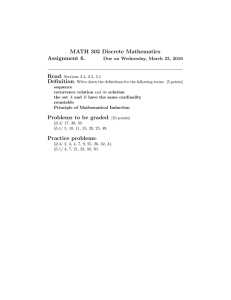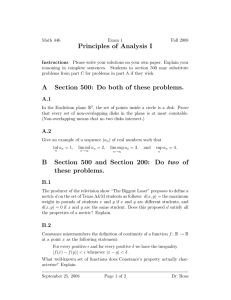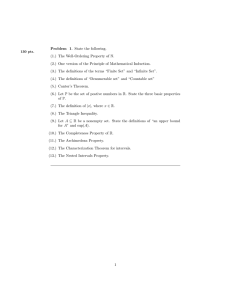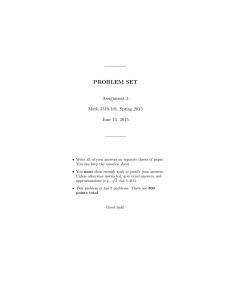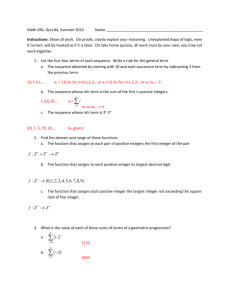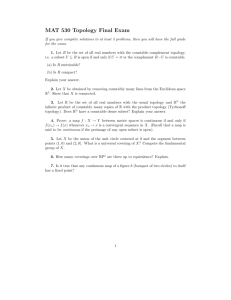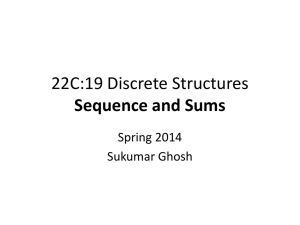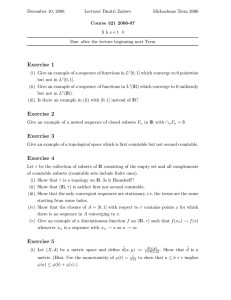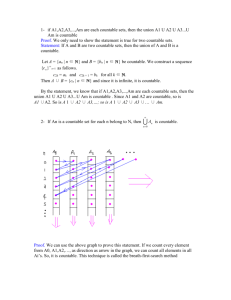σ-LOCALLY COUNTABLE WEAK-BASES SPACES WITH
advertisement
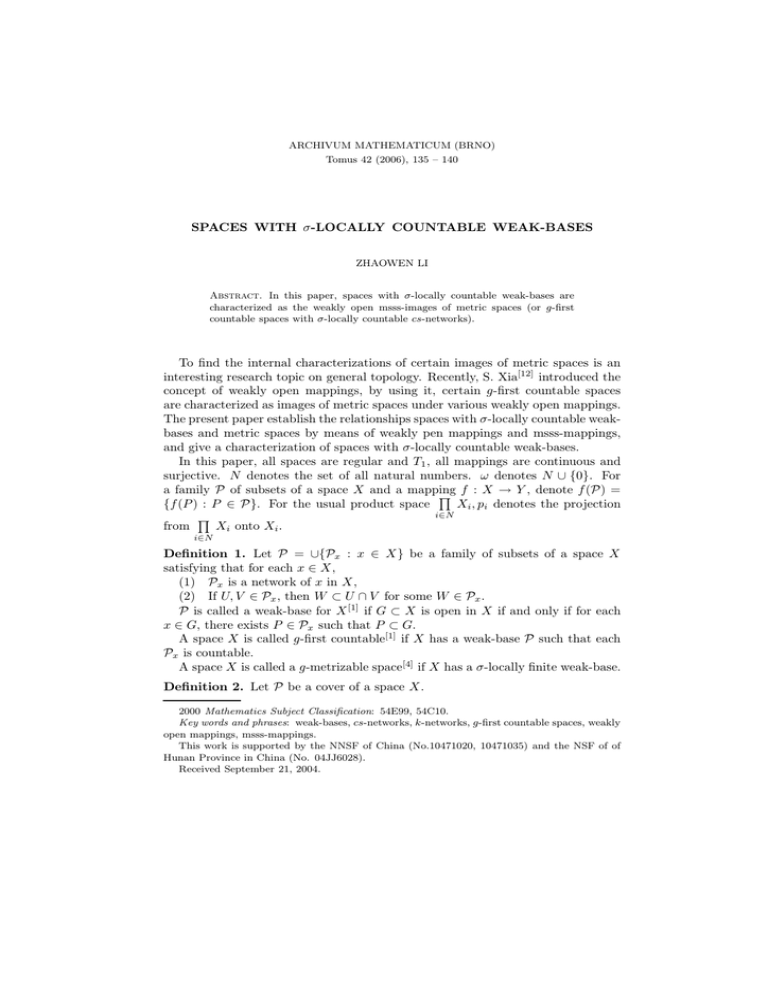
ARCHIVUM MATHEMATICUM (BRNO)
Tomus 42 (2006), 135 – 140
SPACES WITH σ-LOCALLY COUNTABLE WEAK-BASES
ZHAOWEN LI
Abstract. In this paper, spaces with σ-locally countable weak-bases are
characterized as the weakly open msss-images of metric spaces (or g-first
countable spaces with σ-locally countable cs-networks).
To find the internal characterizations of certain images of metric spaces is an
interesting research topic on general topology. Recently, S. Xia[12] introduced the
concept of weakly open mappings, by using it, certain g-first countable spaces
are characterized as images of metric spaces under various weakly open mappings.
The present paper establish the relationships spaces with σ-locally countable weakbases and metric spaces by means of weakly pen mappings and msss-mappings,
and give a characterization of spaces with σ-locally countable weak-bases.
In this paper, all spaces are regular and T1 , all mappings are continuous and
surjective. N denotes the set of all natural numbers. ω denotes N ∪ {0}. For
a family P of subsets of a space X and a mapping
Q f : X → Y , denote f (P) =
Xi , pi denotes the projection
{f (P ) : P ∈ P}. For the usual product space
i∈N
Q
Xi onto Xi .
from
i∈N
Definition 1. Let P = ∪{Px : x ∈ X} be a family of subsets of a space X
satisfying that for each x ∈ X,
(1) Px is a network of x in X,
(2) If U, V ∈ Px , then W ⊂ U ∩ V for some W ∈ Px .
P is called a weak-base for X [1] if G ⊂ X is open in X if and only if for each
x ∈ G, there exists P ∈ Px such that P ⊂ G.
A space X is called g-first countable[1] if X has a weak-base P such that each
Px is countable.
A space X is called a g-metrizable space[4] if X has a σ-locally finite weak-base.
Definition 2. Let P be a cover of a space X.
2000 Mathematics Subject Classification: 54E99, 54C10.
Key words and phrases: weak-bases, cs-networks, k-networks, g-first countable spaces, weakly
open mappings, msss-mappings.
This work is supported by the NNSF of China (No.10471020, 10471035) and the NSF of of
Hunan Province in China (No. 04JJ6028).
Received September 21, 2004.
136
ZHAOWEN LI
(1) P is called a k-network for X if for each compact subset K of X and its open
neighbourhood V , there exists a finite subfamily P ′ of P such that K ⊂ ∪P ′ ⊂ V .
(2) P is called a cs-network for X if for each x ∈ X, its open neighbourhood
V and a sequence {xn } converging to x, there exists P ∈ P such that {xn : n ≥
m} ∪ {x} ⊂ P ⊂ V for some m ∈ N .
A space X is called an ℵ-space if X has a σ-locally finite k-network.
Definition 3. Let f : X → Y be a mapping.
(1) f is called a weakly open mapping[12] if there exists a weak-base B =
∪{By : y ∈ Y } for Y and for y ∈ Y , there exists x(y) ∈ f −1 (y) satisfying condition
(∗): for each open neighbourhood U of x(y), By ⊂ f (U ) for some By ∈ By .
(2) f is called a msss-mapping[7] (i.e., metrizably stratified
strong s-mapping)
Q
Xi of the family {Xi :
if there exists a subspace X of the usual product space
i∈N
i ∈ N } of metric spaces satisfying the following condition: for each y ∈ Y , there
exists an open neighbourhood sequence {Vi } of y in Y such that each pi f −1 (Vi ) is
separable in Xi .
Theorem 4. A space Y has a σ-locally countable weak-base if and only if Y is
the weakly open msss-image of a metric space.
Proof. Sufficiency. Suppose Y is the image of a metric space X under a weakly
open msss-mapping f . Since f is a msss-mapping, then exists a family {Xi : i ∈ N }
of metric spaces satisfying the condition of Definition 3 (2).
For each i ∈ N , let Pi be a σ-locally finite base for Xi , put
n
\
o
Bi = X ∩
p−1
j (Pj ) : Pj ∈ Pj and j ≤ i ,
j≤i
B = ∪{Bi : i ∈ N } .
Then B is a base for X. For each n ∈ N , put
\
V =
Vi ,
j≤i
then {Q ∈ f (Bi ) : V ∩ Q 6= Φ} is countable. Thus f (Bi ) is locally countable in Y .
Hence f (B) is σ-locally countable in Y .
Since f is a weakly open mapping, then exists a weak-base P = ∪{Py : y ∈ Y }
for Y such that for each y ∈ Y , there exists x(y) ∈ f −1 (y) satisfying the condition
(∗) of Definition 3 (1). For each y ∈ Y , put
Fi,y = {f (B) : x(y) ∈ B ∈ Bi } ,
Fy = ∪{Fi,y : i ∈ N } ,
Fi = ∪{Fi,y : y ∈ Y } ,
F = ∪{Fy : y ∈ Y } .
Obviously, Fi ∈ f (Bi ) for each i ∈ N , then Fi is locally countable in Y . Thus
F = ∪{Fi : i ∈ N } is σ-locally countable in Y . We will prove that F is a weak-base
for Y .
SPACES WITH σ-LOCALLY COUNTABLE WEAK-BASES
137
It is obvious that F satisfies the condition (1) of Definition 1. For each y ∈ Y ,
suppose U, V ∈ Fy , then U ∈ Fm,y , V ∈ Fn,y for some m, n ∈ N . Thus there exist
B1 ∈ Bm and B2 ∈ Bn such that x(y) ∈ B1 ∩B2 , f (B1 ) = U and f (B2 ) = V . Since
B1 , B2 ∈ B and B is a base for X, then there exist l ∈ N and B ∈ Bl such that
x(y) ∈ B ⊂ B1 ∩ B2 . Thus f (B) ∈ Fl,y ⊂ Fy and f (B) ⊂ f (B1 ∩ B2 ) ⊂ U ∩ V .
Hence F satisfies the condition (2) of Definition 1.
Suppose G ⊂ Y and for y ∈ G, there exists F ∈ Fy such that F ⊂ G, then there
exists B ∈ B such that x(y) ∈ B and F = f (B). Since B is an open neighbourhood
of x(y) and f is a weakly open mapping, then exists Py ∈ Py such that Py ⊂ f (B).
Thus for each y ∈ G, there exists Py ∈ Py such that Py ⊂ G. Hence G is open
in Y because P is a weak-base for Y . On the other hard. Suppose G ⊂ Y is
open in Y , then for each y ∈ G, x(y) ∈ f −1 (G). Since B is a base for X, then
x(y) ∈ B ⊂ f −1 (G) for some B ∈ B. Thus f (B) ∈ Fy and f (B) ⊂ G.
Therefore F is a weak-base for Y .
Necessity. Suppose Y has a σ-locally countable weak-base. Let P = ∪{Pi : i ∈
N } be a σ-locally countable weak-base for Y , where each Pi = {Pα : α ∈ Ai } is
a locally countable of subsets of Y which is closed under finite intersections and
Y ∈ Pi ⊂ Pi+1 . For each i ∈ N , endow Ai with discrete topology, then Ai is a
metric space. Put
n
Y
X = α = (αi ) ∈
Ai : {Pαi : i ∈ N } ⊂ P
i∈N
o
forms a network at some point x(α) ∈ X ,
and endow X with the subspace topology induced from the usual product topology
of the family {Ai : i ∈ N } of metric spaces, then X is a metric space. Since Y
is Hausdroff, x(α) is unique in Y for each α ∈ X. We define f : X → Y by
f (α) = x(α) for each α ∈ X. Because P is a σ-locally countable weak-base for Y ,
then f is surjective. For each α = (αi ) ∈ M , f (α) = x(α). Suppose V is an open
neighbourhood of x(α) in Y , there exists n ∈ N such that x(α) ∈ Pαn ⊂ V , set
W = {c ∈ X : the n-the coordinate of c is αn }, then W is an open neighbourhood
of α in X, and f (W ) ⊂ Pαn ⊂ V . Hence f is continuous. We will show that f is
a weakly open msss-mapping.
(i) f is a msss-mapping. For each x ∈ X and each i ∈ N , there exists an open
neighbourhood Vi of x in X such that {α ∈ Ai : Pα ∩ Vi 6= Φ} is countable. Put
Bi = {α ∈ Ai : Pα ∩ Vi 6= Φ} ,
−1
then pi f (Vi ) ⊂ Bi . Thus pi f −1 (Vi ) is separable in Ai , Hence f is a msssmapping.
(ii) f is a weakly open mapping
For each n ∈ N and αn ∈ An , put
V (α1 , · · · , αn ) = {β ∈ X : for each i ≤ n, the i-th coordinate of β is αi } .
It is easy to check that {V (α1 , · · · , αn ) : n ∈ N } is a locally neighbourhood base
of α in X.
138
ZHAOWEN LI
T
Pαi for each n ∈ N .
Claim. f V (α1 , · · · , αn ) =
i≤n
T
Pαi .
For each i ≤ n, f V (α1 , · · · , αn ) ⊂ Pαi , then f V (α1 , · · · , αn ) ⊂
i≤n
T
Pαi , there is β = (βj ) ∈ X such that
On the other hand. For each x ∈
i≤n
f (β) = x. For each j ∈ N , Pβj ∈ Pj ⊂ Pj+n , then there is αj+n ∈ Aj+n such
) and f (α) = x. Thus
that Pαj+n = Pβj . Set α =
(αj ), then α ∈ V (α1 , · · · , αnT
T
Pαi .
Pαi ⊂ f V (α1 , · · · , αn ) . Hence f V (α1 , · · · , αn ) =
i≤n
i≤n
Denote Py = {P ∈ P : y ∈ P }, then P = ∪{Py : y ∈ Q
Y }.
Ai such that {Pαi : i ∈
For each y ∈ Y , by the idea P, there exists (αi ) ∈
i∈N
N } ⊂ P is a network of y in Y , then α = (αi ) ∈ f −1 (y).
Suppose G is an open neighbourhood of α in X, then there exists j ∈ N
such that V (α1 ,· · · , αj ) ⊂ G. Thus f V (α1 , · · · , αj ) ⊂ f (G). By the Claim,
T
T
Pαi for some Py ∈ Py . Hence Py ⊂
Pαi . Since Py ⊂
f V (α1 , · · · , αj ) =
i≤j
i≤j
f (G).
Therefore there exists a weak-base P for Y and α ∈ f −1 (y) satisfying the
condition (∗) of Definition 3 (1), and so f is a weakly open mapping.
Theorem 5. For a space X, (1) ⇐⇒ (2) ⇒ (3) below hold.
(1) X has a σ-locally countable weak-base.
(2) X is a g-first countable space with a σ-locally countable cs-network.
(3) X is a g-first countable space with a σ-locally countable k-network.
Proof. (1) ⇒ (2) is obvious.
(2) ⇒ (3). Suppose X is a g-first countable space with a σ-locally countable
cs-network. Let P = ∪{Pn : n ∈ N } be a σ-locally countable cs-network for X,
where each Pn is locally countable in X. We will show that P is a k-network for
X. Suppose K ⊂ V with K non-empty compact and V open in X. For each
n ∈ N , put
An = {P ∈ Pn : P ∩ K 6= Φ and P ⊂ V } ,
then An is countable,
S Denote A = {Pi :
S and so A = ∪{An : n ∈ N } is countable.
Pi for each n ∈ N ,
Pi for some n ∈ N . Otherwise, K 6⊂
i ∈ N }, then K ⊂
i≤n
i≤n
S
Pi . Because {P ∩ K : P ∈ P} is a countable cs-network for
so choose xn ∈ K\
i≤n
a subspace K and a compact space with a countable network is metrizable, then
K is a compact metrizable space. Thus {xn } has a convergent subsequence {xnk },
where xnk → x. Obviously x ∈ K. Since P is a cs-network for X, then there exist
m ∈ N and P ∈ P such that {xnk : k ≥ m} ∪ {x} ⊂ P ⊂ V . Now, P = Pj for
some j ∈ N . Take l ≥ m such that nl ≥ j, then xnl ∈ Pj . This is a contradiction.
Therefore, (2) ⇒ (3) holds.
(2) ⇒ (1). Suppose X is a g-first countable space with σ-locally countable
cs-network. Let P = ∪{Pm : m ∈ N } be a σ-locally countable cs-network for X,
where each Pm is locally countable in X which is closed under finite intersections
SPACES WITH σ-LOCALLY COUNTABLE WEAK-BASES
139
and X ∈ Pm ⊂ Pm+1 , and for each x ∈ X, let {B(n, x) : n ∈ N } be a decreasing
weak neighbourhood sequence of x in X. Put
Fm,x = {P ∈ Pm : B(n, x) ⊂ P for some n ∈ N } ,
Fx = ∪{Fm,x : m ∈ N }
Fm = ∪{Fm,x : x ∈ X}
F = ∪{Fx : x ∈ X}
we will show that F is a σ-locally countable weak-base for X.
It is easy to check that F satisfies the condition (1), (2) of Definition 1.
Suppose G be an open subset of X, then for each x ∈ G, there exists P ∈ Fx
with P ⊂ G. Otherwise, denote {P ∈ P : x ∈ P ⊂ G} = {P (m, x) : m ∈ N }.
Then B(n, x) 6⊂ P (m, x) for each n, m ∈ N , so choose xn,m ∈ B(n, x)\P (m, x).
For n ≥ m, let xn,m = yk , where k = m + n(n−1)
. The the sequence {yk : k ∈ N }
2
converges to the point x. Thus, there exist m, i ∈ N such that {yk : k ≥ i} ∪ {x} ⊂
P (m, x) ⊂ G because P is a cs-network for X. Take j ≥ i with yj = xn,m for
some n ≥ m. Then xn,m ∈ P (m, x). This is a contradiction. On the other hand.
If G ⊂ X satisfies that for each x ∈ G there exists P ∈ Fx with P ⊂ G, then
B(n, x) ⊂ G for some n ∈ N . Thus G is open in X.
Hence F is a weak-base for X.
For each m ∈ N , Fm ⊂ Pm , then Fm is locally countable in X. Thus F =
∪{Fm : m ∈ N } is σ-locally countable in X. Therefore, (2) ⇒ (1) holds.
Corollary 6. A paracompact space with a σ-locally countable weak-base is gmetrizable.
Proof. Suppose X is a paracompact space with a σ-locally countable weak-base.
By Theorem 5, X is a g-first countable space with a σ-locally countable k-network.
Since a paracompact space with a σ-locally countable k-network is an ℵ-space ([9,
Lemma 1]), then X is an ℵ-space. Thus X is g-metrizable by Theorem 2.4 in
[6].
In conclusion of this paper, we pose the following question in view of Theorem 5.
Question 7. Does (3) ⇒ (1) in Theorem 6 hold?
Acknowledgment. The author would like to thank the referee for his valuable
suggestions.
References
[1] Arhangel’skii, A., Mappings and spaces, Russian Math. Surveys 21 (1966), 115–162.
[2] Liu, C., Dai, M., g-metrizability and Sω , Topology Appl. 60 (1994), 185–189.
[3] Michael, E., σ-locally finite mappings, Proc. Amer. Math. Soc. 65 (1977), 159–164.
[4] Siwiec, F., On defining a space by a weak-base, Pacific J. Math. 52 (1974), 233–245.
[5] Nagata, J., General metric spaces I, in Topics in General Topology, North-Holland,
Amsterdam, 1989.
[6] Foged, L., On g-metrizability, Pacific J. Math. 98 (1982), 327–332.
140
ZHAOWEN LI
[7] Lin, S., Locally countable families, locally finite families and Alexandroff ’s problems, Acta
Math. Sinica 37 (1994), 491–496.
[8] Lin, S., Generalized metric spaces and mappings, Chinese Sci. Bull., Beijing, 1995.
[9] Lin, S., On Lašnev spaces, Acta Math. Sinica 34 (1991), 222–225.
[10] Lin, S., Tanaka, Y., Point-countable k-networks, closed maps, and related results, Topology
Appl. 59 (1994), 79–86.
[11] Lin, S., Li, Z., Li, J., Liu, C., On ss-mappings, Northeast. Math. J. 9 (1993), 521–524.
[12] Xia, S., Characterizations of certain g-first countable spaces, Adv. Math. 29 (2000), 61–64.
[13] Tanaka, Y., Xia, S., Certain s-images of locally separable metric spaces, Questions Answers
Gen. Topology 14 (1996), 217–231.
[14] Tanaka, Y., Li, Z., Certain covering-maps and k-networks, and related matters, Topology
Proc. 27 (2003), 317–334.
[15] Li, Z., Lin, S., On the weak-open images of metric spaces, Czechoslovak Math. J. 54 (2004),
393–400.
[16] Li, Z., Spaces with a σ-locally countable base, Far East J. Math. Sci. 13 (2004), 101–108.
College of Mathematics and Econometrics, Hunan University
Changsha, Hunan 410082, P. R. China
E-mail: Lizhaowen8846@163.com
Current address: Department of Information, Hunan Business College
Changsha, Hunan 410205, P. R. China
